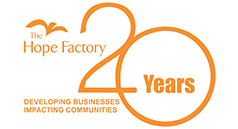The Hope Factory scoops GIBS' social entrepreneur award
Johannesburg, Wednesday, September 12, 2007 – The Hope Factory, an Enterprise Development initiative of the South African Institute of Chartered Accountants (SAICA), yesterday (September 11) won the Gordon Institute of Business Science (GIBS) Social Entrepreneur on the Brink Award.
The GIBS Social Entrepreneur of the Year Awards honoured the contribution that social entrepreneurs make to South African society through four category awards: The Social Entrepreneur on the Brink, The Bequeathing Leader, The Believer and The Benefactor.
The Hope Factory scooped the Social Entrepreneur on the Brink Award. GIBS believes that this is a watershed moment in the lifecycle of The Hope Factory as a social entrepreneurship initiative. Both the idea and the organisation would benefit from the appropriate recognition.
“We are very grateful for winning the GIBS Social Entrepreneur of the Year Award. The prize money of
R 35 000 will be reinvested in the training of more potential entrepreneurs,” says Elizabeth Zambonini, Founder and Chief Executive of The Hope Factory.
The Hope Factory is a non-profit organisation founded in 2001 by Zambonini. It strives to directly impact on the lives of previously disadvantaged South Africans by empowering and inspiring them to be self-reliant and productive though the provision of technical skills, business and life skills and job and wealth creation opportunities.
The Hope Factory is one of SAICA's flagship projects for Enterprise Development. As part of the job creation programme, The Hope Factory manufactures a wide range of beautiful and handmade corporate gifts and conference materials tailored to suit the corporate market.
“The Hope Factory has done well since its establishment and continues to attain great success in achieving its objectives, we have trained more than 424 unemployed people and provided job creation opportunities for 80 staff.” says Zambonini.
In addition to the GIBS award, The Hope Factory has been ranked as one of South Africa's top seven training service providers by the Department of Labour and has received other numerous awards including The Argus Angel of the City Award and the Sowetan / Old Mutual / SABC2 Community Builder of the Year Award: Emerging business.
”SAICA is exceptionally proud of Elizabeth and The Hope Factory team,” says Chantyl Mulder, SAICA's Senior Executive for Transformation. Mulder says The Hope Factory is an exemplary model for eradicating poverty and empowering disadvantaged women in rural areas with entrepreneurial skills.
She says corporate companies must play a meaningful role in the quest to create employment, and uplift the community by purchasing high quality and trendy products from The Hope Factory.
Critically, The Hope Factory's approach to training is holistic, focusing on developing each person entering the programme. The typical individual arrives from a poverty-stricken environment with a low self-esteem. Many are single mothers who need to provide for their families, but don't know where to start and The Hope Factory assists them in building a better life for themselves and their children.
“A significant benefit is the acquisition of integrated business skills. The training is integrated, practical and about understanding business concepts. This proves that social entrepreneurship delivers real enterprise development,” says Mulder.
Throughout the programme there is a full-time mentor who works with the trainees from day one and examines their visions and goals. The trainees meet with the mentor on a monthly basis to look at their future plans upon leaving the factory. The issues that arise include:
- Whether they are in immediate need of money;
- Whether they are looking for formal sector employment;
- Whether they intend pursuing a job creation opportunity; or
- Whether they desire to start their own business.
After graduating from the 15 week course, many move into the The Hope Factory Job Creation programme and make products that are sold to companies. This enables them to obtain practical work experience and earn an income, and allowing them time to start their own business, while putting bread on the table.










